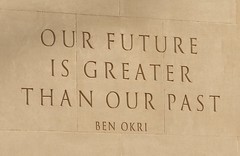September 29, 2009
Dreamtime
 Robin has written a very interesting sum up/conclusion to a series of blogs about far future economics: This is the Dream Time.
Robin has written a very interesting sum up/conclusion to a series of blogs about far future economics: This is the Dream Time.
His basic argument is that in the long run replicators will replicate to fill their ecological/economical niche. Since the amount of "stuff" that we can get is limited by at most polynomial expansion across the cosmos (and reproduction can be exponential), our descendants will be under strong pressure to be frugal, probably existing on a subsistence level.
At the same time, if we expand outwards lightspeed limitations makes it hard to communicate with every part of the metacivilization. This would make it hard to achieve the strong cultural control to keep eager replicators from replicating fast, as well as cultural or species homogeneity. He thinks they would experience lives worth living.
His conclusion is that we are living in an unique era where we have broken free from the Malthusian constraints of the past, and not yet hit the constraints of the future. This gives us unprecedented freedom and wealth, including the freedom to be completely wrong with (almost) impunity. So maybe we are living in the golden age *now*?
An analogy would be the demographic transition. In the old days, mortality and fertility were high. Then better medicine and lifestyle arrived, and mortality declined. The result was a transition through a state of high fertility and low mortality, until fertility began to decrease. The result is of course a major shift in human societies - for a while there is extra people in working age, the range of possible life project changes, time discounting changes, the timing of inheritance changes, and so on.
Although Robin seems pretty happy with this scenario many others seem to have trouble with it on various grounds:
 Some reject it because they think speaking about far-future humanity is impossible: crucial limitations such as economics or lightspeed will be abolished eventually. Another possibility is that humans will change themselves so the predictions are irrelevant. But while long-term predictions are obviously vulnerable, stuff like thermodynamics, information limits, lightspeed, scale separation and economics might be pretty robust. And while we may have little to say about what is actually going on and being valued, we might say a bit about the low-level stuff.
Some reject it because they think speaking about far-future humanity is impossible: crucial limitations such as economics or lightspeed will be abolished eventually. Another possibility is that humans will change themselves so the predictions are irrelevant. But while long-term predictions are obviously vulnerable, stuff like thermodynamics, information limits, lightspeed, scale separation and economics might be pretty robust. And while we may have little to say about what is actually going on and being valued, we might say a bit about the low-level stuff.
Many seem to mistake Robin's position as saying that in 10,000 years there will be an enormous population or value per atom. This is a misreading: the absurd values only show up if one assumes economic growth to continue without limit. Robin argues that eventually the exponential growth of humans and economy will taper off because of limited stuff and limited complexity of the laws of physics. Not everybody agrees that a virtual economy needs to have its economic growth bounded by the amount of matter to build the base level hardware: clearly we can value a particular atom nearly arbitrarily high (e.g. if it was the key to the survival of all of humanity), and cultural products of relatively low information content can gain tremendous economic (and perhaps hedonistic value) - just consider certain modern art or cartoons. But a finite amount of stuff still means a finite amount of memory and value-experiencing machinery.
Another possibility is that humans or their descendants will coordinate their growth so that it is slower than the growth of available stuff, producing an ever richer population. But then we better do that very soon, because within a short (by astronomical, biological and macrohistorical standards) time span we will likely spread over distances where coordination is hard to re-achieve.
 It seems that his argument is vulnerable (insofar anything is vulnerable) to the Doomsday argument: why should we find ourselves here at the unusual transition rather than among the teeming masses of posthumans of the endless future? There are two unsettling potential non-extinction answers: one is that the transition also means the end of conscious observers, or that we are living in a simulation.
It seems that his argument is vulnerable (insofar anything is vulnerable) to the Doomsday argument: why should we find ourselves here at the unusual transition rather than among the teeming masses of posthumans of the endless future? There are two unsettling potential non-extinction answers: one is that the transition also means the end of conscious observers, or that we are living in a simulation.
The first option would correspond to Nick's scenario of mindless outsourcers or perhaps the galactic locust swarm of Robin's burning the cosmic common scenario - we evolve into a non-conscious but evolutionarily successful form. The reason we find ourselves here is simply that most observers will exist during the lead-up to the non-observer posthuman phase (and not during the long period of low population before modernization).
The second option would be that Nick's simulation argument is true: most observers do exist within the teeming posthuman future, but many are deluded about the actual time because they live in history simulations. In fact, Robin's blog makes this even more plausible by arguing that our era, for various reasons, is the most interesting and mythical era to the posthumans. We are living in their dreamtime, so of all eras to make simulations of, this is one of the most popular. It is/was not just an era of unprecedented wealth, but also a lot of drama, bizarre beliefs and mental states, important decisions that shaped the modern posthuman world.
So, if you buy Robert's argument *and* the doomsday argument, you should expect to be among the last "real humans" before we turn into posthuman goo, or that you live in a historical recreation. If you buy the doomsday argument but do not believe in Robin's argument, then there are a few other options:
- The vanilla doomsday scenario.
- The future posthumans are a single group-mind, counting as just one observer.
- We develop coordination enough to keep our posthuman population very small (and rich).
- Posthumans are not in our reference class.
- Various vanilla escapes: not all humans are in your reference class, there are alien civilizations in your reference class etc.
Personally, I find Robin's argument intriguing. I'm not quite as horrified as many seem to be by the claim that in the future almost everybody will be very poor. After all, being poor in a western society today actually means a far higher standard than most of our ancestors could achieve. It is not inconceivable that we would envy desperately poor posthumans if we knew about their situation.
It has slightly increased my belief in the chance that this is a simulation, since the world seems almost suspiciously interesting. However, Freeman Dyson suggested a curious possibility: what if we are living in the most interesting of all possible worlds? If that turned out to be true, then I would expect the tapering off of discovery Robin is predicting will not happen, and the future would be even more inhomogeneous and confusing than we could possibly imagine.